THE FRENCH OPERA
VERSION FRANCAISE DISPONIBLE. VEUILLEZ CLIQUER SUR L'ICONE (BAS DE PAGE)
DEFINITION
At the beginning of the 19th century, comic opera experienced a revival with Boieldieu and Adam.
Boieldieu (1775, 1834) remains the principal French composer of operas of the first quarter of the 19th century. He composed nearly 40 operas, including " La Dame Blanche " (1825).
Adolphe Adam , author of ballet music including " Giselle ", also composed around forty operas including " Le Postillon de Longjumeau " in 1836.
But the first half of the 19th century saw above all the creation of the grand French opera by Esprit Auber (1782-1871) with " La muette de Portici " in 1828, and especially Giacomo Meyerbeer (1791-1864), a German established in Paris, with " Robert le Diable " (1831), " les Huguenots " (1836), " le Prophète " (1849). It was Meyerbeer who established the canons of the grand opera, namely: Five acts with ballets and recitatives, imposing choruses, numerous solo roles, rich sets and costumes.
We have seen previously that the grand French opera was largely represented in Paris by Italian composers such as Rossini, Donizetti, Verdi. It was also represented by some French composers such as Fromental Halévy (1799-1862), quickly forgotten after the success of "La Juive" in 1835, and by Hector Berlioz (1803-1869) with "Benvenuto Cellini" which met with little success in 1838. It would continue until 1870 with Ambroise Thomas (1811-1896) and his opera "Hamlet" in 1868, and again Berlioz with "Les Troyens" in 1869.
MEYERBEER (1791-1864)
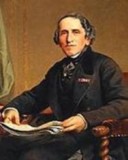
Giacomo Meyerbeer was born Jakob Liebmann Meyer Beer on September 5, 1791 in Berlin. He changed his name when he went to Italy, where he stayed from 1815 to 1824 to study opera.
After returning to Berlin, he settled in Paris in 1827, where he achieved immense success in 1831 with " Robert le diable ", one of the most significant works of grand opera . With the same librettist, Eugène Scribe, he then composed " Les Huguenots " in 1836, then, among his 18 operas, " Le prophète " in 1849, " L'Etoile du nord " in 1854, " Dinorah " in 1859 and " L'Africaine " created in 1865 after his death.
Meyerbeer, now somewhat forgotten, influenced many opera composers of his time, including Verdi and Wagner themselves, with the grandiose character of his works.
BERLIOZ (1803-1869)
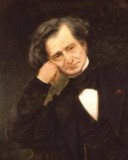
A true creator of the modern orchestra, Berlioz was more appreciated in Germany and Russia than in France.
His career as an opera composer was particularly frustrating after the failure of his opera " Benvenuto Cellini " in 1838.
His other operas had a hard time establishing themselves in France. "La Damnation de Faust " was only performed in concert during his lifetime, as for his most grandiose opera, " Les Troyens ", only acts 3 to 5 were performed during his lifetime.
His last opera " Béatrice et Bénédict " was successfully premiered in Germany in 1862 but not until 1890 in Paris.
GOUNOD (1818-1893)
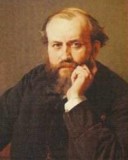
Charles Gounod was born on June 17, 1818 in Paris and died on October 18, 1893 in St-Cloud.
Gounod studied at the Paris Conservatory and won the Prix de Rome in 1837. On his return from the Villa Medici in 1843, he worked as an organist before achieving his greatest success at the opera.
Gounod wrote a dozen operas but is most famous for " Faust " (1859) after Goethe and " Romeo and Juliet " (1867) after Shakespeare. "Faust" in particular, and its famous "air des bijoux" repeated by La Castafiore throughout the Tintin albums, is still today one of the most performed operas in the world.
We can also cite« Le médecin malgré lui »(1858) after Molière and “ Mireille ” (1864) after Frédéric Mistral.
Gounod also composed religious music including masses, requiems and the famous Ave Maria on Bach's fir
BIZET (1838-1875)
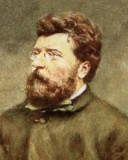
Georges Bizet was born on October 25, 1838 in Paris and died on June 3, 1875 in Bougival.
Often depressed and doubting his own artistic value, he abandoned or withdrew many projects, sometimes even after rehearsals had already begun. His most appreciated works today are mainly his Symphony in C major (1855), his operas " The Pearl Fishers " (1863), " The Pretty Girl from Perth " (1867) and " Djamileh " (1872), the " Children's Games " for piano 4 hands (1870), the suite of " L'Arlésienne " (1872) after Daudet, and of course " Carmen " (1874) which remains the most performed opera in the world.
Bizet's operas were in their time rather poorly received by critics who reproached them for their Wagnerism. Even "Carmen" was coldly received at the first performances: it was reproached for the immorality of Carmen and the crude realism of her final murder. "Carmen" did not achieve success until 6 months after the composer's death.
After the failure of "Carmen", Bizet retired to Bougival in a state of deep
MASSENET (1842-1912)
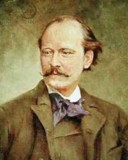
Jules Massenet was born on May 12, 1842 in Montaud (Saint-Etienne) and died on August 13, 1912 in Paris.
Author of 27 operas, he is mainly known for 2 of them: " Manon " (1884) and " Werther " (1892). His opera " Thaïs " (1894) is best known for the famous "Meditation of Thaïs" for violin and orchestra, which is extracted from it.
Massenet was also the author of ballets, oratorios, and melodies, and taught composition at the Paris Conservatory where his students included Gustave Charpentier, Ernest Chausson, George Enesco, Gabriel Pierné and Florent Schmitt.





